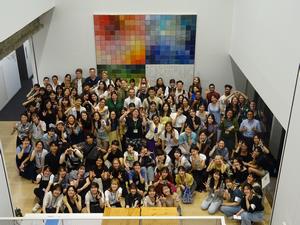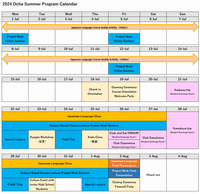- Summer Program
- Report on the FY2024 Summer Program
ページの本文です。
Report on the FY2024 Summer Program
2024年8月8日更新
(日本語での記載はこちら)
Following the impact of COVID-19, the Summer Program has been held online from 2020 to 2022. In 2023, we resumed in-person activities. In 2024, we continued to leverage the experience gained from the previous years. For the English Project Work Course, students from our partner universities abroad and our university collaborated on projects. We held online seminars before their arrival (July 1–12) to start group. After arriving in Japan, they engaged in in-person classes and group work.
The Japanese Language Course for Japanese learners also offered an online buddy activity with a Japanese conversation partners from July 1 until their arrival. Classes for the Japanese Language Course and the Subject Based Course in English started on July 22.
A total of 231 participants joined the program, including 65 international students (from 19 partner universities across 13 countries), 74 students from our university, 23 high school students from affiliated high schools, and 69 members of the Summer Program Student Committee.
In the Japanese Language Course, the students explored Tokyo on their own for a day then gave presentations on the last day.
The Subject Based Course featured intensive lectures on the three subjects: "Gender, Globalization and Diversity in Contemporary Japan," "Natural Science: Basic Questions and Applications," and "Exploring Human Life and Environmental Sciences: Integrating Perspectives on Health, Society, and Technology." In the Project Work Course, multinational teams learned about Japanese society, international issues, and leadership skills.
As part of the class, special summer-program lectures were given by Ms. Kiyono Yagami, CEO of Manabiya Mom Co., Ltd. on "Women's Empowerment in Contemporary Japan: Implications and Perspectives for Gender Equality" as well as by Ms. Mihoko Manabe, Director and Audit & Supervisory Committee Member of Torii Pharmaceutical Co., Ltd., on "Female Business Leadership in Japan and Abroad." These lectures deepened the participants’ understanding of global leadership.
Cultural events such as “Kyogen Workshop” and “KODO Experience,” and a joint event with our affiliated high school, Ochanomizu University Junior High School, on the theme of “Food” (attended by 39 junior high school students), were held to learn about Japanese culture.
The opening ceremony, original campus tours, welcome and farewell parties, Onigiri cooking experience, club activities (tea ceremony, archery, Noh), day tours to Asakusa and Kamakura, and the closing ceremony were organized by the Summer Program Student Committee, a volunteer organization of our university's students. In addition, they produced program booklets, daily life support guides and online buddy activities. The program ended with great success, fostering lively international exchanges.
Orange: Japanese Language Course (12th year) - only for overseas partner students
Blue: Subject Based Course (14th year) and Project Work Course
Ochanomizu University students can take either or both Subject Based Course and Project Work Course. Ochanomizu University high school students take only the Subject Based Course.
A total of 65 international students from 19 schools in 13 countries, 74 Ochanomizu University students, and 23 affiliated high school students participated across the three courses.





















